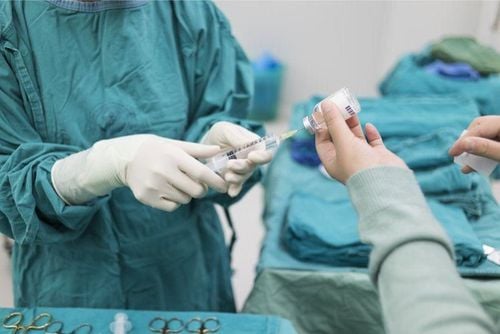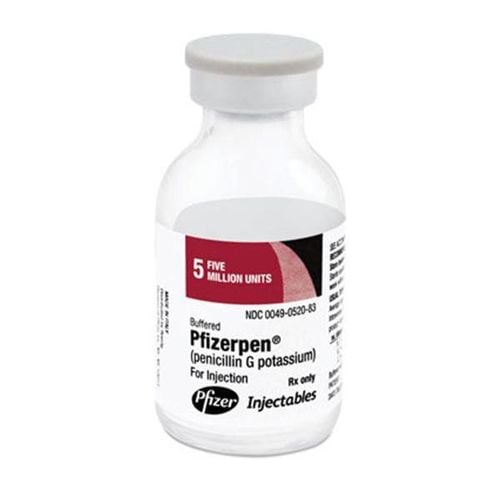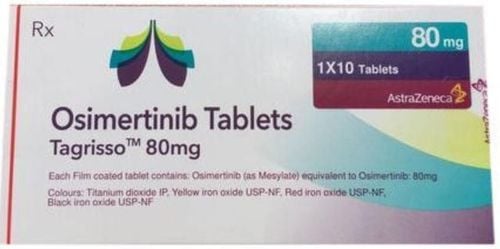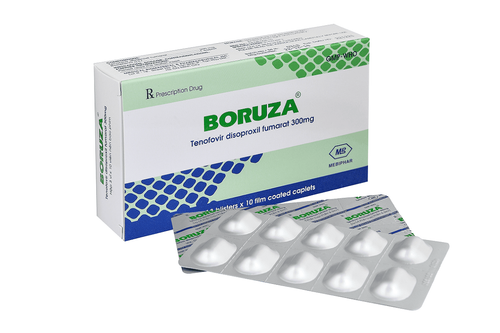This is an automatically translated article.
Valcyte belongs to the group of anti-parasitic and anti-infective, antiviral, antifungal drugs commonly used to treat retinitis in immunocompromised patients and some other diseases such as pneumonia, colitis and pharyngitis. manage. In addition, the drug can also be used to prevent CMV infection in organ transplant patients.1. What disease does Valcyte treat?
Valcyte contains the main ingredient Valganciclovir, which is a prodrug of ganciclovir that inhibits Herpes virus replication in vitro and in vivo. Ganciclovir has bacteriostatic activity due to inhibition of viral DNA synthesis by:Competitive inhibition of deoxyguanosine triphosphate compounds into DNA by viral DNA polymerase. Incorporation of ganciclovir triphosphate into viral DNA results in a much reduced or destroyed viral DNA chain elongation. The clinical antiviral activity of Valcyte has been documented in the treatment of AIDS patients with a new diagnosis of CMV retinitis. CMV viral load from 46% to 7% after 4 weeks of Valcyte treatment. Therefore, the effect of Valcyte drug is mainly to treat:
CMV retinitis in immunocompromised patients including AIDS Other CMV infections include pneumonia, colitis and esophagitis. Prevention of CMV disease in at-risk organ transplant patients. Valcyte is contraindicated in patients with hypersensitivity to aciclovir or ganciclovir as well as in patients with a neutrophil count less than 500/mm3, platelet count less than 25000/mm3.
2. Dosage of the drug Valcyte
Valcyte tablets must be taken with meals. Meanwhile, Valcyte solution should only be used intravenously because if injected intramuscularly or subcutaneously, tissue will be severely irritated due to the high pH of ganciclovir (about 11). Ideally, Valcyte should be given slowly intravenously at a constant rate for at least 1 hour, using solutions with a concentration not exceeding 10 mg/ml, and the patient should be adequately hydrated to avoid increased toxicity. Use an infusion device with a membrane filter with a pore size of 0.22 - 5 micrometers.Depending on the intended use, the dose of Valcyte will be different, specifically as follows:
For the treatment of retinitis caused by MCV, patients with stable renal function: Initial dose: 5mg/kg slow intravenous infusion over 1 hour, at constant rate, every 12 hours, administered for 14-21 days then switch to maintenance therapy Maintenance dose: 5mg/kg/day by slow intravenous infusion over 1 hour , once/day, administered for 7 days/week or 6mg/kg/day for 5 days/week Similar to the treatment of CMV retinitis but the duration of the initial course is 7-14 days. The duration of the maintenance dose depends on the clinical manifestations and the degree of immunosuppression. In case of CMV seropositive organ transplant patients, the duration of treatment should be at least 1 month. Therapeutic dose for patients with renal failure: Creatinine clearance 50 - 69ml/min: 1500 mg/day each time or 500mg, 3 times/day. Creatinine clearance 25 - 49ml/min: 1000 mg once daily or 500 mg twice daily. Creatinine clearance 10-24ml/min: 500mg once daily Creatinine clearance less than 10ml/min: 500mg/times, 3 times/week after hemodialysis. Continuous hemo-venous or veno-venous hemodialysis: 2.5 mg/kg/time, every 24 hours. The method of reconstitution of Valcyte solution for infusion is as follows: Ganciclovir is dissolved in 10ml of distilled water for injection (50mg/ml). , then dilute with 0.9% sodium chloride solution or 5% dextrose solution, or Ringer's infusion solution or Ringer lactate to obtain a solution containing not more than 10mg/ml. Do not use water for injection containing paraben preservatives because it can cause precipitation. The solution for infusion must be used within 24 hours to reduce the risk of infection.
3. Erythromycin side effects
In some patients when using Valcyte, side effects may occur such as:
Fever. Anemia, leukopenia, thrombocytopenia. Peripheral rash. Tremor, loss of appetite, dizziness, headache. Eosinophilia increased. Arrhythmia, hypertension or hypotension. Constipation, diarrhea, abdominal pain, nausea. Coma, confusion, easy insomnia, agitation. Hair loss, itching, hives. Shortness of breath. Pain and inflammation of the vein at the injection site.
4. Be careful when using Valcyte
Some general notes when using Valcyte include:Care should be taken when using Valcyte in patients with renal failure, do not administer intravenously or inject the whole dose at once. Pay attention to the appropriate dose for the elderly. Because leukopenia, anemia, thrombocytopenia, thrombocytopenia, bone marrow suppression, and aplastic anemia have been reported in patients treated with Valcyte, treatment should not be initiated with a neutrophil count. less than 500 or platelet count less than 25000 or hemoglobin less than 8g/dl Valcyte should not be used concurrently with imipenem - cilastatin as there have been cases of convulsions in patients with concomitant use of these two drugs Ganciclovir can cause teratogenicity or toxicity of pregnancy when used in normal human doses; therefore, women of childbearing age should use safe contraception during treatment with ganciclovir and for 90 days after discontinuation of treatment. There is no evidence that Ganciclovir is excreted in human milk. However, due to the potential for teratogenicity, nursing mothers should stop breastfeeding while taking Ganciclovir, do not breastfeed until 72 hours after the last dose.
5. Drug interactions
Some common drug interactions with Valcyte include:Administering Didanosin 2 hours before Ganciclovir reduces the AUC at steady state of Ganciclovir. Probenecid reduces the renal elimination of ganciclovir. Both zidovudine and ganciclovir have the potential to reduce neutrophils and cause anemia, which is a harmful synergistic effect. Concomitant administration of ganciclovir and imipenem - cilastatin may cause convulsions. Ganciclovir is not recommended to be used with drugs such as Dapson, Pentamidine, Flucytosine, Vincristine, Vinblastine, Adriamycin, Amphotericin B, Cotrimoxazol because it may increase the toxicity of the drug.
Vinmec International General Hospital is one of the hospitals that not only ensures professional quality with a team of leading doctors, modern equipment and technology, but also stands out for its examination and consulting services. and comprehensive, professional medical treatment; civilized, polite, safe and sterile medical examination and treatment space.
Please dial HOTLINE for more information or register for an appointment HERE. Download MyVinmec app to make appointments faster and to manage your bookings easily.













